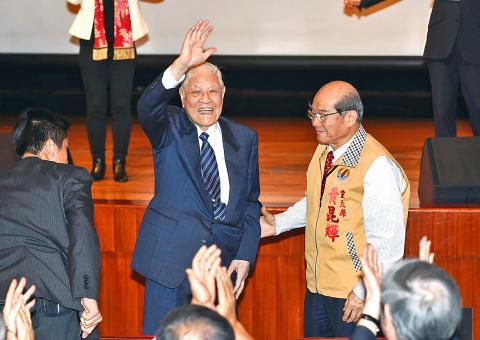Former president Lee Teng-hui’s (李登輝) condition has stabilized after he had a minor stroke, but he is to remain hospitalized under observation, Lee’s office said yesterday.
“Lee was sent to the Taipei Veterans General Hospital in the early hours of Friday after experiencing numbness in his right hand,” Lee’s office director Wang Yan-chun (王燕軍) said in a statement issued yesterday afternoon.
Following a series of examinations, Wang said the hospital concluded that Lee’s symptoms were caused by an embolism that occurred in the small peripheral arteries of the left hemisphere of his brain.

Photo: Fang Pin-chao, Taipei Times
Due to the hospital’s attentive care and treatment, Lee’s condition has stabilized and he will remain in the hospital to recuperate, Wang said.
“We appreciate everyone’s concerns, but we have to decline any visitors during Lee’s time in hospital in accordance with doctors’ advice,” Wang said.
Separately yesterday, Democratic Progressive Party (DPP) presidential candidate Tsai Ing-wen (蔡英文) said she was aware of Lee’s condition, but has not had the time to visit him in person, adding that DPP Secretary-General Joseph Wu (吳釗燮) has called Lee’s office to pass on her regards.
Lee, 92, served as president from 1988 to 2000.
In 1988, then-vice president Lee became the first Taiwan-born president when then-president Chiang Ching-kuo (蔣經國) passed away. Lee became the first popularly elected president of Taiwan in 1996.
In July 2013, Lee underwent vertebral artery stenting surgery after he suffered from a vertebral artery occlusion.
He was diagnosed with colon cancer in November 2011, when he had a tumor estimated at 3.5cm by 2.5cm removed.

INVESTIGATION: The case is the latest instance of a DPP figure being implicated in an espionage network accused of allegedly leaking information to Chinese intelligence Democratic Progressive Party (DPP) member Ho Jen-chieh (何仁傑) was detained and held incommunicado yesterday on suspicion of spying for China during his tenure as assistant to then-minister of foreign affairs Joseph Wu (吳釗燮). The Taipei District Prosecutors’ Office said Ho was implicated during its investigation into alleged spying activities by former Presidential Office consultant Wu Shang-yu (吳尚雨). Prosecutors said there is reason to believe Ho breached the National Security Act (國家安全法) by leaking classified Ministry of Foreign Affairs information to Chinese intelligence. Following interrogation, prosecutors petitioned the Taipei District Court to detain Ho, citing concerns over potential collusion or tampering of evidence. The

Seventy percent of middle and elementary schools now conduct English classes entirely in English, the Ministry of Education said, as it encourages schools nationwide to adopt this practice Minister of Education (MOE) Cheng Ying-yao (鄭英耀) is scheduled to present a report on the government’s bilingual education policy to the Legislative Yuan’s Education and Culture Committee today. The report would outline strategies aimed at expanding access to education, reducing regional disparities and improving talent cultivation. Implementation of bilingual education policies has varied across local governments, occasionally drawing public criticism. For example, some schools have required teachers of non-English subjects to pass English proficiency

NEGOTIATIONS: The US response to the countermeasures and plans Taiwan presented has been positive, including boosting procurement and investment, the president said Taiwan is included in the first group for trade negotiations with the US, President William Lai (賴清德) said yesterday, as he seeks to shield Taiwanese exporters from a 32 percent tariff. In Washington, US Trade Representative Jamieson Greer said in an interview on Fox News on Thursday that he would speak to his Taiwanese and Israeli counterparts yesterday about tariffs after holding a long discussion with the Vietnamese earlier. US President Donald Trump on Wednesday postponed punishing levies on multiple trade partners, including Taiwan, for three months after trillions of US dollars were wiped off global markets. He has maintained a 10 percent

TRADE: The premier pledged safeguards on ‘Made in Taiwan’ labeling, anti-dumping measures and stricter export controls to strengthen its position in trade talks Products labeled “made in Taiwan” must be genuinely made in Taiwan, Premier Cho Jung-tai (卓榮泰) said yesterday, vowing to enforce strict safeguards against “origin laundering” and initiate anti-dumping investigations to prevent China dumping its products in Taiwan. Cho made the remarks in a discussion session with representatives from industries in Kaohsiung. In response to the US government’s recent announcement of “reciprocal” tariffs on its trading partners, President William Lai (賴清德) and Cho last week began a series of consultations with industry leaders nationwide to gather feedback and address concerns. Taiwanese and US officials held a videoconference on Friday evening to discuss the